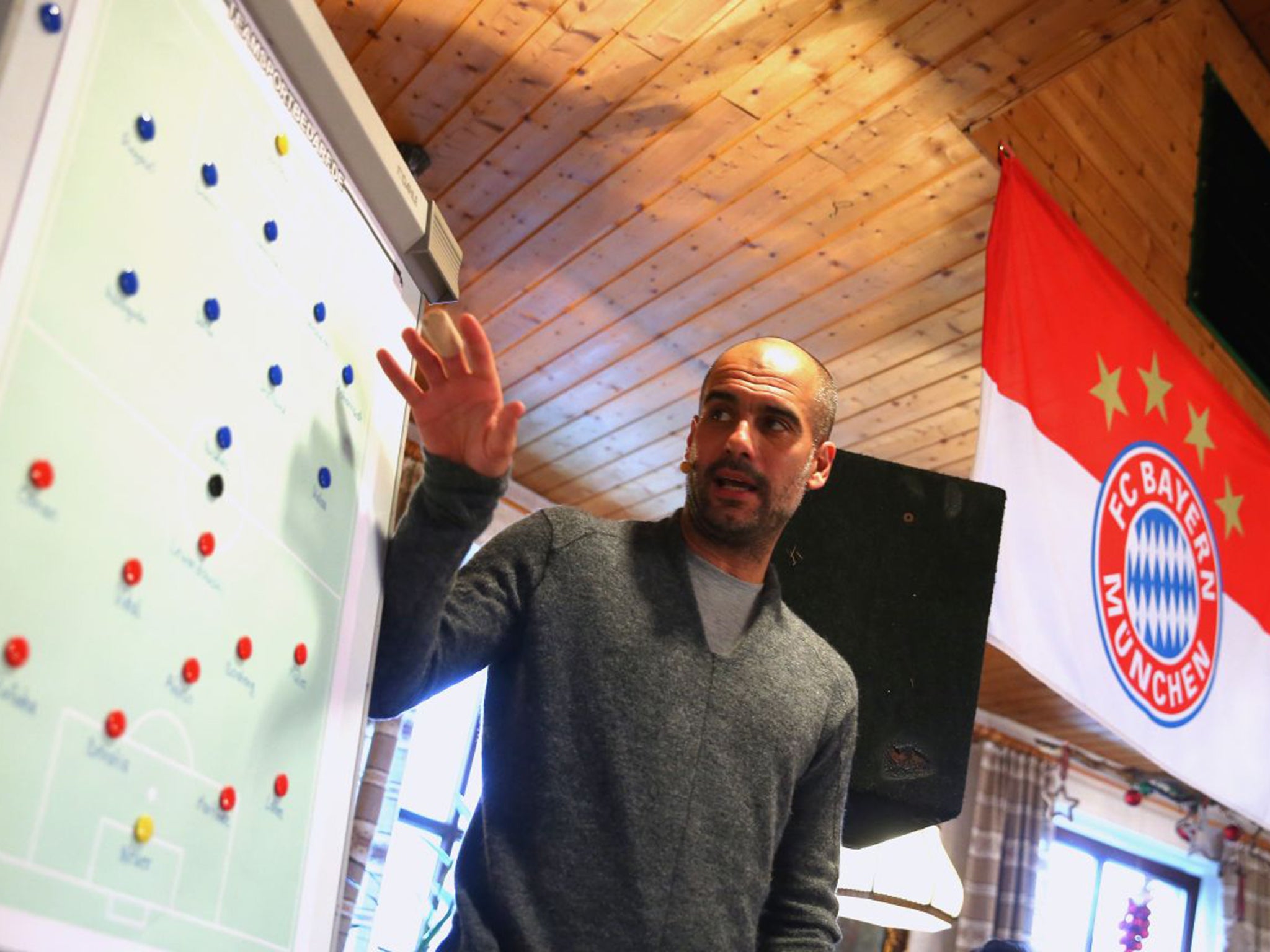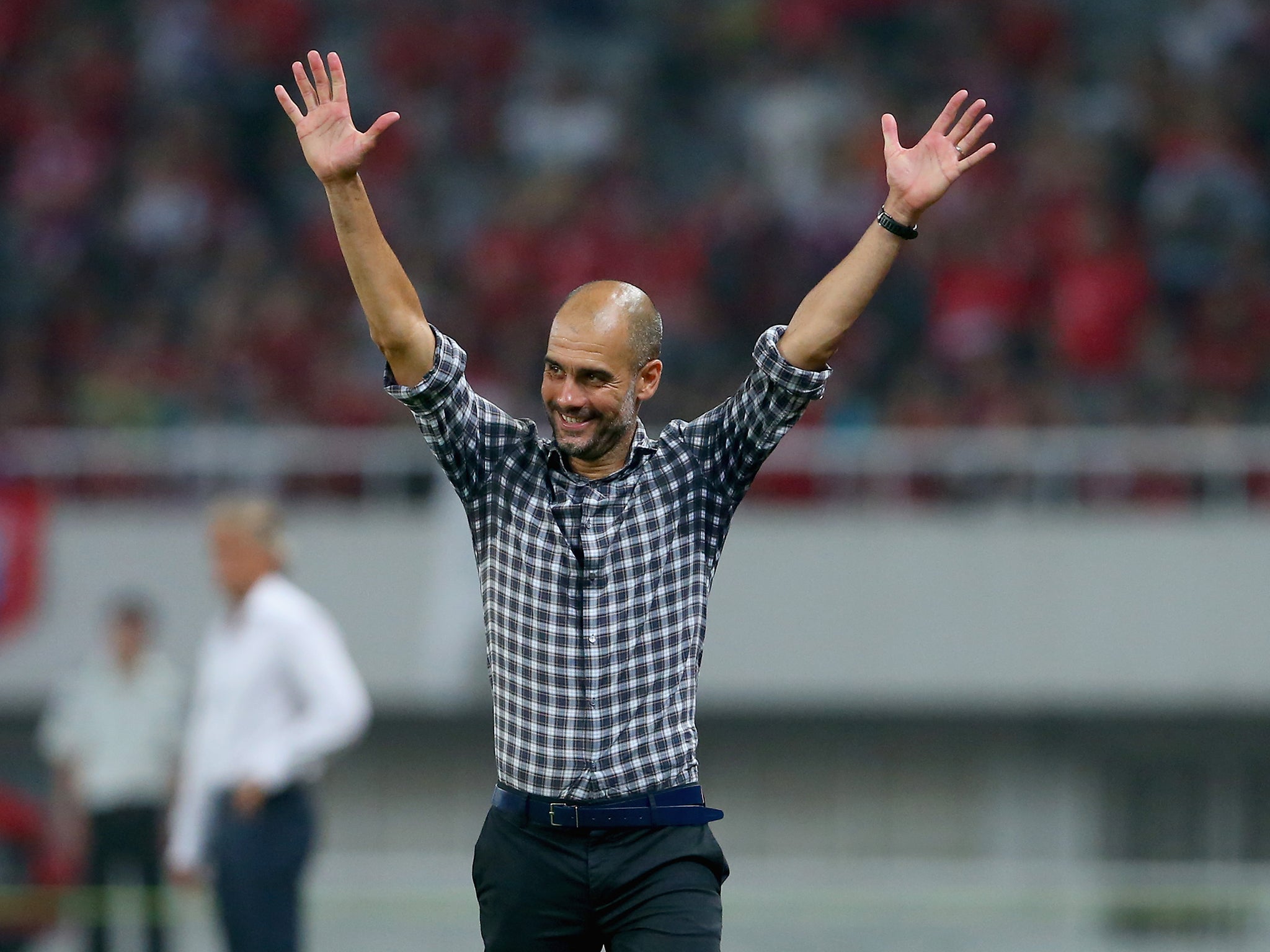Will Pep Guardiola leave Bayern for Premier League next season?
It is already shaping up to be a thrilling Premier League season but as the campaign reaches its halfway point the most intriguing long-term question is whether a Spaniard currently working in Germany will be managing in England next August

Santa Claus will have his work cut out in Munich this year. With an eight-point lead at the top of the Bundesliga and annual profits of more than €20million, the city’s hugely popular football team Bayern Munich will want for very little this Christmas.
There is, perhaps, just one thing. At the Christmas party of Bayern’s official fan club in Vilsbiburg last week, one audacious Father Christmas presented the club’s celebrated coach Pep Guardiola with a beautifully tied scroll. On it, the Santa explained, was a contract extension that would last for the rest of Guardiola’s life. All Pep needed to do was to sign his name and fill in “whatever amount of money he thought was appropriate”.
The 44-year-old laughed along, but inside, he must have been cringing. The most coveted coach in world football has had quite enough of contract discussions.
A former Barcelona player and Spain international, Guardiola rose to managerial prominence when, at the age of 37, he took the reins at Barcelona and immediately guided the Catalan club to a period of unprecedented success and acclaim. Under his guidance, they won three La Liga titles and two Champions Leagues, while playing what many regard as the greatest club football in living memory.
His tenure at Barca established Guardiola as arguably the greatest coach of his generation but it also took an enormous emotional toll and he resigned in 2012. After a year’s sabbatical in New York, he had the pick of Europe’s top jobs and chose Bayern, joining in the summer of 2013 on a three-year contract.

It is that contract which is set to expire next summer, which is why the speculation as to his whereabouts next August has reached fever pitch.
Bayern and their coach have steadfastly refused to answer questions over a contract extension. A decision, both say, will be made by the end of December. “From the first day I arrived here, I’ve been very happy,” Guardiola said in Vilsbiburg, “my family have been very happy. I’m very happy in this city, I’m happy at the club.”
He didn’t sound particularly happy. For all the warm words, Guardiola could not hide the irritation in his voice, nor the exasperated expression on his face.
Wohin Pep? Whither Pep? It is the question dominating the sports pages in Germany this winter. It is the question for which nobody has an answer.
If Guardiola does leave, he will almost certainly do so for a job in the Premier League. The Catalan was a committed Anglophile as a player, and is said to regret not taking an opportunity to play for Manchester United. He has often spoken of his love for the atmosphere of the English game.
“I hope I get the opportunity to work in the Premier League,” he said in an interview in 2013, “I want to feel the supporters, the environment, the media and the style of the players and everything.” Having won two European Cup finals at Wembley with Barcelona, he said his relationship with England was “pretty close”.
Just a few weeks after that interview, it was announced that Guardiola had signed a three-year contract with Bayern Munich. Yet his fascination with the English game remained. Marti Perarnau, the Spanish journalist who shadowed Guardiola through his first year at Bayern, has repeatedly insisted that the Premier League will be Pep’s next stop after Munich.
Almost all of England’s top clubs have been linked to him. Manchester City are the leading candidates, not so much because of their wealth but because of their director of football. Txiki Begiristain is a good friend of Guardiola’s and worked with him at Barcelona before joining City. It was he who persuaded the Barcelona board to appoint Guardiola as first-team coach in 2008.
Chelsea and Arsenal are also in the running, with Guardiola rumoured to favour a move to London. His wife Cristina Serra is said to love the city, while his football agent brother is officially a resident. The Gunners in particular might be thought to offer the kind of stability which Guardiola has appreciated so much at Barcelona and Bayern.
On the other hand, there are many ways in which Guardiola seems well suited to life in Germany. Having started lessons while he was in New York, he speaks German well, though not as well as he speaks English. The German culture, meanwhile, seems to suit Guardiola’s natural reticence. He has only warm words for his adopted home. “The Germans have exemplary behaviour,” he said in 2014. “If a politician makes a mistake in this country, then he resigns. There’s a very good dynamic here”.
Munich and Germany have also provided the perfect environment for Guardiola to pursue his passions outside of football. The Bayern coach attended a political rally for Catalan independence at Berlin’s Alexanderplatz last year. In June, he appeared at Munich’s Literaturhaus to hold a reading of work by the Catalan poet Miquel Marti i Pol. Guardiola had befriended the poet shortly before his death from multiple sclerosis. A work entitled “Book of Loneliness” is dedicated to Guardiola and his wife.
Guardiola’s footballing project in Munich is also far from complete. Under his guidance, Bayern wrapped up Bundesliga titles by early April in both 2014 and 2015, but that is the minimum requirement. They are heading for the title this season, notwithstanding yesterday’s 3-1 defeat at Borussia Mönchengladbach.
So far Guardiola’s Bayern have failed to win the Champions League, losing in each of his two seasons to the eventual winners in the semi-finals, Real Madrid and Barcelona. Bayern had just won the Champions League when Guardiola arrived, his predecessor Jupp Heynckes having secured the Treble with Bayern before being ousted to make way for the Catalan. That is why Guardiola has repeatedly admitted that, at Bayern, “only the Treble is enough”.
“If Guardiola wins the Champions League, he will go down as one of the great Bayern coaches,” says Wolfram Eilenberger, German philosopher, football pundit and Bayern fan, “if he doesn’t, then he will only go down as a very good one.”
Yet Guardiola feels he is on course. Earlier this month, he said that “I needed time with this team. At the start, I felt it was still Jupp Heynckes’ team. Now our style is much better.”
Perarnau, for one, thinks Guardiola has unfinished business at Bayern. In a recent interview with the Swiss newspaper Neue Zürcher Zeitung, the journalist and close confidante of the Bayern boss said that Bayern “have learned how Guardiola wants them to play. They now need to put it into practice.”
It is certainly true that the team has now adapted brilliantly to Guardiola’s possession-based style, while the coach has now fully acclimatised to the German game. The result is a merciless winning machine. A team who starve their opponents of the ball but can also strike swiftly and brutally with pacy wingers and pinpointed long balls from the back.
It is also one of the most fluid teams in the world. Bayern started their match against Hertha Berlin last weekend with just two players in defence. Risky? Not when you have a team which can change formation completely every five minutes.
Commentators in Germany have so much trouble trying to describe Guardiola’s formations that they usually just resort to superlatives. Last week, former Arsenal goalkeeper Jens Lehmann became the latest in a long list of pundits to say that Guardiola has “brought Bayern to a new level”.
The players are desperate for him to stay. The tactical visionary is also a hands-on man manager, who likes to talk extensively with each of his players as much as possible – and not just about football. When Pierre-Emile Hojbjerg’s father died, Guardiola sought the youngster out to give him personal advice, with both men moved to tears by the conversation.

It is this personal touch which makes him so popular. The former Germany captain Philipp Lahm voiced a passionate appeal to his manager a few weeks ago, while the Spain international Xabi Alonso is said to only be willing to extend his contract if Guardiola stays too.
Guardiola (below) has remained unmoved. He has made it clear that he will not be pushed to make a decision before the end of December. The Bayern board are also standing firm. There was no mention of Guardiola at Bayern’s AGM earlier this month. Chief executive Karl-Heinz Rummenigge stated recently that “managers come and go. No one is irreplaceable”.
It is down to Pep, then. And why would he want to leave? His salary is estimated at £12m and Bayern would have no problem meeting any extra financial demands. It is demands of a different kind which may cause problems for the club. According to certain reports, the 44 year old is keen to take more control of Bayern’s transfer policy.
It is not a request which will endear him to the club or its fans. Like all German clubs, Bayern’s activities on the transfer market are defined not only by the manager, but by the sporting director and the board. Guardiola arrived at Bayern with a transfer policy ultimatum: “Thiago or nothing”. He got Thiago, but he has had to do things the Bayern way ever since.
Traditionally, Bayern have been careful not to let a coach eclipse the club and its identity. Mia san Mia, as the club motto says: we are us, and nobody tells us what to do. Louis van Gaal and Jürgen Klinsmann were both sacked after the board felt they had become too big for their boots. To give Guardiola full control of transfers would be an unprecedented move in Bayern’s 40 years of dominance.
Another crucial part of Bayern’s philosophy has been the development of German players. Though Guardiola has worked closely with the youth teams, many Bayern fans fear that his penchant for expensive foreigners is keeping the club’s best young talent away from first team football. “Bayern has changed Guardiola,” says Wolfram Eilenberger, “he has become a more complete coach than he ever was at Barcelona. But Guardiola has also changed Bayern... from the fan’s point of view, he has hollowed out Bayern’s identity.”
The sale of the brilliant German midfielder Bastian Schweinsteiger to Manchester United infuriated Bayern fans and they blamed Guardiola. They fear the same might happen to Thomas Müller, who has often been disgruntled at his lack of playing time under Guardiola. The power struggles over transfer policy could yet drive the Catalan to England, where the clubs and the fans would be far more willing to give Guardiola a free rein. “In my view, what Guardiola wants is not money,” says Eilenberger, “he wants control of the narrative. Guardiola is a narrator.”
Guardiola the narrator. The man who revolutionised the game and wants to revolutionise it again. This month, he will choose which way the narrative goes from here.
Join our commenting forum
Join thought-provoking conversations, follow other Independent readers and see their replies
Comments
Bookmark popover
Removed from bookmarks